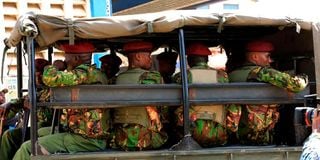Heavy security deployment as poll plans in high gear

General Service Unit (GSU) Police Officers patrol at Kongowea area in Mombasa as Kenyans head to the Elections. Security has been beefed up at the Kenyan Coast ahead of the August 9 General Election.
The government yesterday began moving security officers, equipment and machinery across the country as preparations for next week’s elections got into high gear.
Dozens of lorries, armed personnel and water cannons were yesterday spotted on Waiyaki Way in Nairobi heading west as the General Service Unit and other contingents of the police service continued being deployed mainly to electoral violence hotspots across the country, where they are expected to be stationed for the next eight days.
This came as the United States warned its citizens to be cautious when in Kisumu, as election-related demonstrations may occur in the Lakeside region that may in some instances turn violent.
“Out of an abundance of caution, the Embassy has imposed movement restrictions on personnel in Kisumu. The State Department reminds US citizens of the continued need for sustained vigilance,” warned an advisory from the American Embassy.
“Election-related demonstrations and rallies regularly take place in the run-up to the elections and are likely to continue, at times blocking key intersections and causing traffic jams.
“Demonstrations may occasionally be violent, requiring police intervention,” the advisory read in part.
US Secretary of State Antony Blinken at the same time called for peaceful polls.
“Kenyans will soon have the opportunity to showcase their democracy to the world as they make their voices heard in their elections. We urge a peaceful and transparent democratic process, which is critical to delivering a more prosperous and secure future for all Kenyans,” said Mr Blinken.
Kisumu has been named by the National Cohesion and Integration Commission (NCIC) as one of the counties at the highest risk of election-related violence.
Other potential hotspots include Nakuru, Nairobi, Kericho, Mombasa and Uasin Gishu.
The other counties mapped by the NCIC as possible epicentres of violence – albeit at a lower risk – are Narok, Marsabit, Laikipia, Lamu, Baringo, Isiolo, Meru, Nandi, Samburu, Bomet, Embu, Nyandarua, Makueni, Busia, Taita-Taveta, Tharaka-Nithi, Kitui and Kajiado.
These 23 counties are expected to witness heavier deployment as the election date inches closer to the August 9 General Election, which will be secured by more than 150,000 security officers drawn mainly from the National Police Service (NPS).
They NPS officers will be assisted by their counterparts from the Kenya Prisons Service (KPS), the National Youth Service (NYS), the Kenya Forest Service and the Critical Infrastructure Unit.
The NPS has also deployed officers from the newly created Formed Police Unit (FPU), which comprises highly trained personnel who will offer tactical support to the general duty officers who will be tasked with offering security at all the polling stations.
Statistically, there will be at least two officers per each polling station. The rest, especially the special units, will mostly be on standby in all the hotspots and the political strongholds of the two leading candidates – Azimio’s Raila Odinga and Deputy President William Ruto – to handle any eventuality.
These units will be backed up by five logistical air support teams that have been created specifically for this election and which will be stationed strategically to respond quickly to any incident.
All these units will be coordinated by the National Police Service Election Secretariat, which will be under the command of Inspector-General Hillary Mutyambai.
Mr Mutyambai is a key player in the National Multi Sectoral Consultative Forum on Election Preparedness.
The forum, which brings together government ministries, departments and agencies (MDAs), was formed in November last year under the chairpersonship of Chief Justice Martha Koome.
The Independent Electoral and Boundaries Commission (IEBC) refused to be part of the forum, arguing that its involvement in the forum would jeopardise its independence.
The deployment of security forces yesterday came barely a day after Interior Cabinet Secretary Fred Matiang’i said security personnel had been deployed to secure the elections across the country.
Dr Matiang’i was briefing journalists in Nakuru on Tuesday morning after a meeting with senior security officers.
The National Treasury has already asked for an extra Sh90 million for enhancement of security and to facilitate a smooth and seamless transfer of power.
“Following a meeting chaired by the Chief Financial Officer and attended by Finance Officers from the KPS, Administration Police (AP), Directorate of Criminal Investigations (DCI), GSU and officers from the Directorate of Operations, the budget proposals submitted by all regions were discussed and the following came up,” a letter sent yesterday from Vigilance House to all police commanders read in part.
Among the issues raised in the letter is that the IEBC will cater for three meals for each officer at the polling station, pay allowances to 20 officers guarding each polling centre for seven days and fuel police vehicles that will be used to transport election materials.
The Interior ministry will pay allowances for officers who will be stationed outside polling centres, fuel all patrol vehicles that will not be used to transport polling materials and provide meal allowances for officers who will be involved in the elections but who will not be stationed at polling centres.





